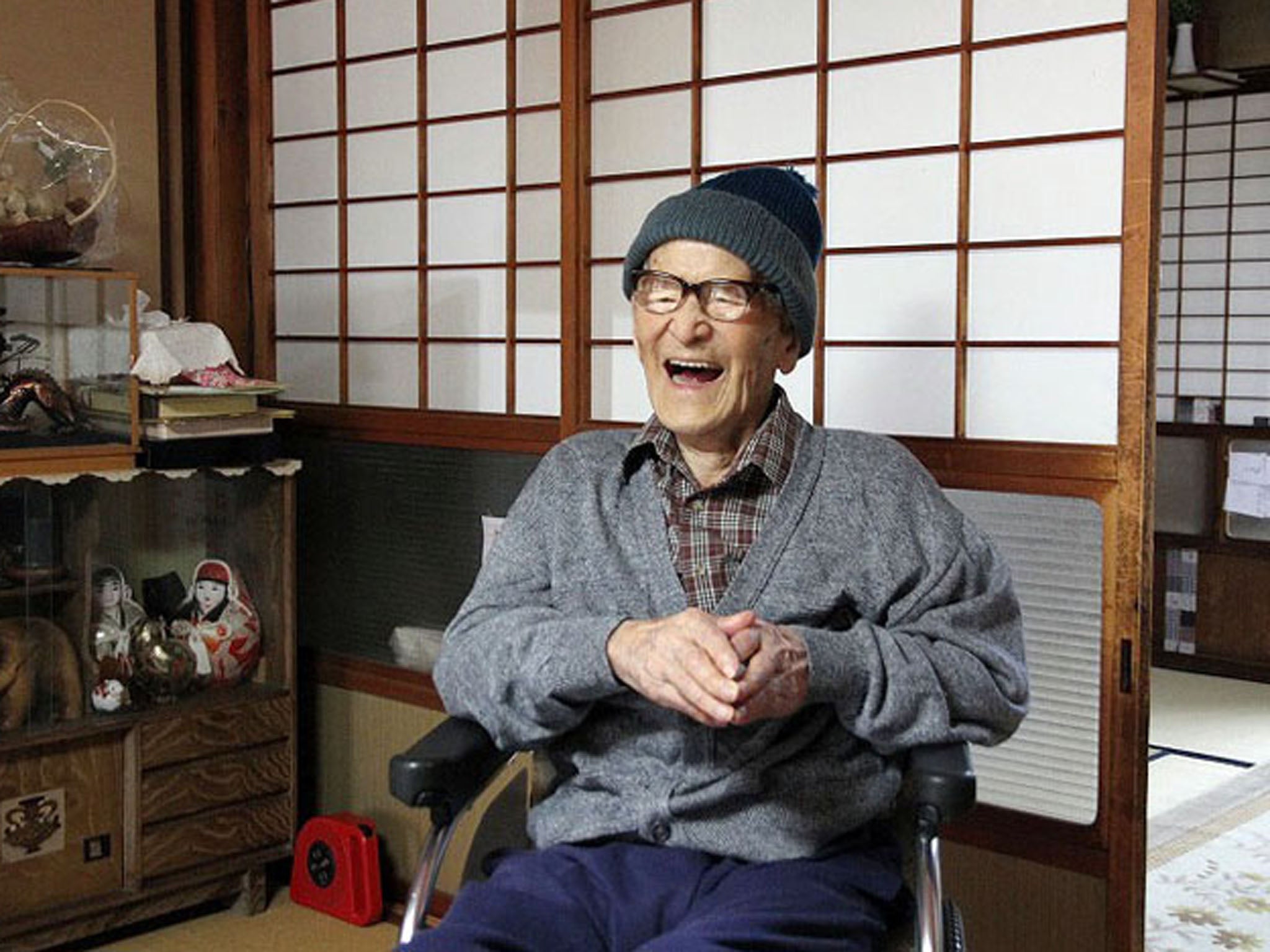Japanese 115-year-old becomes oldest man in recorded history

Your support helps us to tell the story
From reproductive rights to climate change to Big Tech, The Independent is on the ground when the story is developing. Whether it's investigating the financials of Elon Musk's pro-Trump PAC or producing our latest documentary, 'The A Word', which shines a light on the American women fighting for reproductive rights, we know how important it is to parse out the facts from the messaging.
At such a critical moment in US history, we need reporters on the ground. Your donation allows us to keep sending journalists to speak to both sides of the story.
The Independent is trusted by Americans across the entire political spectrum. And unlike many other quality news outlets, we choose not to lock Americans out of our reporting and analysis with paywalls. We believe quality journalism should be available to everyone, paid for by those who can afford it.
Your support makes all the difference.Jiroemon Kimura, a 115-year-old Japanese man born when Queen Victoria still reigned over the British Empire, became the oldest man in recorded history on Friday, according to record keepers.
Kimura, of Kyotango, western Japan, was born April 19, 1897, in the 30th year of the Meiji era, according to Guinness World Records. That makes him 115 years and 253 days as of Friday, breaking the longevity record for men held by Christian Mortensen of California, who died in 1998 at the age of 115 years and 252 days. The oldest woman in recorded history, Frenchwoman Jeanne Calment, died in 1997 at the age of 122.
"He has an amazingly strong will to live," Kimura's nephew Tamotsu Miyake, 80, said in an interview. "He is strongly confident that he lives right and well."
Kimura is among 22 Japanese people on a list of the world's 64 oldest people compiled by the Los Angeles-based Gerontology Research Group, highlighting the challenges facing Japan as its population ages. A combination of the world's highest life expectancy, the world's second-largest public debt and a below- replacement birthrate is straining the nation's pension system, prompting the government to curb payouts, raise contributions and delay the age of eligibility.
Japan's average life expectancy at birth is 83 years, a figure projected to exceed 90 for women by 2050. The number of Japanese centenarians rose 7.6 percent from a year earlier to 51,376 as of September, and there are 40 centenarians per 100,000 people in the country, which has the world's highest proportion of elderly, according to Japan's health ministry.
Kimura became the world's oldest currently living person on Dec. 17, when 115-year-old Dina Manfredini of Iowa died, according to London-based Guinness and the Gerontology Research Group. Manfredini was born 15 days before Kimura.
Kimura was in a hospital Friday morning, Yasuhiro Kawato, head of the section for elderly welfare at Kyotango's city hall, said by phone.
"His condition has improved, and we're not worried, but the doctors said it would be best if he stayed in the hospital into the new year," Kawato said.
The world's second-oldest living person, Japanese woman Koto Okubo, turned 115 on Dec. 24.
Kimura lives with his grandson's widow, Eiko Kimura, in a two-story wooden house he built in the 1960s. Eiko wakes him up every day at 7:30 a.m. and takes him by wheelchair to a dining room for breakfast consisting of porridge and miso soup with potatoes and vegetables. He has never suffered from serious diseases, can communicate and spends most of his time in bed, Eiko said.
"Grandpa is positive and optimistic," she said. "He becomes cheerful when he has guests. He's well with a good appetite. Even when he falls ill, I can tell he'll recover."
Kimura, the third of six children, was born as Kinjiro Miyake in Kamiukawa, a fishing and farming village sandwiched between the mountains and the Sea of Japan. His parents, Morizo and Fusa Miyake, were farmers who grew rice and vegetables.
Only two years earlier, Japan's success in the First Sino- Japanese War had established the nation as the dominant power in East Asia. Less than a year after Kimura was born, the sinking of the US battleship Maine in Havana Harbor would trigger the Spanish-American War.
According to Kimura's nephew Tamotsu, the 115-year-old's birthday is actually March 19. Official records say he was born April 19 because an official misprinted the month when records from merging towns were consolidated in 1955, the nephew said.
After finishing school at the age of 14 as the second-best student in his class, Kimura worked at local post offices for 45 years until his retirement in 1962 at the age of 65. He also worked at a government communication unit in Korea in the 1920s, when the peninsula was under Japanese rule, and returned to marry his neighbor Yae Kimura.
As his wife's family didn't have a male heir, he changed his name to Jiroemon Kimura, making him the ninth person in the family to bear the name. Since retiring, he has enjoyed reading newspapers and watching sumo wrestling on television. He sometimes helped his son farm until he was about 90 years old, Eiko Kimura said.
Kimura was a disciplined, serious man when he was younger, Miyake said. Even when he drank with his brothers, he would sit straight and keep quiet, Miyake said.
His wife, Yae, died 34 years ago at the age of 74. Four of Kimura's five siblings lived to be more than 90 years old, and his youngest brother, Tetsuo, died at 100, Miyake said. Kimura's living descendants include five children, 14 grandchildren, 25 great-grandchildren and 13 great-great-grandchildren.
The United States has an estimated 80,000 centenarians, or about 25 per 100,000 people, according to researchers at the Okinawa Centenarian Study.
— With assistance from Terje Langeland and Brian Fowler in Tokyo.
Join our commenting forum
Join thought-provoking conversations, follow other Independent readers and see their replies
0Comments